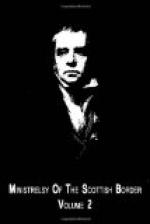The fendes han the knight ynome,
To a stinkand water thai ben ycome,
He no seigh never er non swiche;
It stank fouler than ani hounde.
And maui mile it was to the grounde.
And was as swart as piche.
And Owain seigh ther ouer ligge
A swithe strong naru brigge:
The fendes seyd tho;
“Lo! sir knight, sestow this?
“This is the brigge of paradis,
“Here ouer thou must
go.
“And we the schul with stones prowe,
“And the winde the schul ouer blow,
“And wirche the full
wo;
“Thou no schalt tor all this unduerd,
“Bot gif thou falle a midwerd,
“To our fewes[A] mo.
“And when thou art adown yfalle,
“Than schal com our felawes alle,
“And with
her hokes the hede;
“We schul the teche a newe play:
“Thou hast served ous mani a day,
“And into helle the lede.”
Owain biheld the brigge smert,
The water ther under blac and swert,
And sore him gan
to drede:
For of othing he tok yeme,
Never mot, in sonne beme,
Thicker than the
fendes yede.
The brigge was as heigh as a tour,
And as scharpe as a rasour,
And naru it was
also;
And the water that ther ran under,
Brend o’ lighting and of thonder,
That thoght him
michel wo.
Ther nis no clerk may write with ynke,
No no man no may bithink,
No no maister
deuine;
That is ymade forsoth ywis.
Under the brigge of paradis,
Halvendel the
pine.
So the dominical ous telle,
That is the pure entrae of helle,
Seine Poule berth
witnesse;[A]
Whoso falleth of the brigge adown,
Of him nis no redempcioun,
Noither more nor
lesse.
The fendes seyd to the knight tho,
“Ouer this brigge might thou nowght
go,
“For noneskines
nede;
“Fle peril sorwe and wo,
“And to that stede ther thou com
fro,
“Wel fair
we schul the lede.”
Owain anon be gan bithenche,
Fram hou mani of the fendes wrenche,
God him saved hadde;
He sett his fot opon the brigge,
No feld he no scharpe egge,
No nothing him no drad.
When the fendes yseigh tho,
That he was more than half ygo,
Loude thai gun to crie;
“Alias! alias! that he was born!
“This ich night we have forlorn
“Out of our baylie.”
[Footnote A: Fewes—Probably contracted for fellows.]
[Footnote B: The reader will probably search St Paul in vain, for the evidence here referred to.]
The author of the Legend of Sir Owain, though a zealous catholic, has embraced, in the fullest extent, the Talmudic doctrine of an earthly paradise, distinct from the celestial abode of the just, and serving as a place of initiation, preparatory to perfect bliss, and to the beatific vision.—See the Rabbi Menasse ben Israel, in a treatise called Nishmath Chajim, i.e. The Breath of Life.




